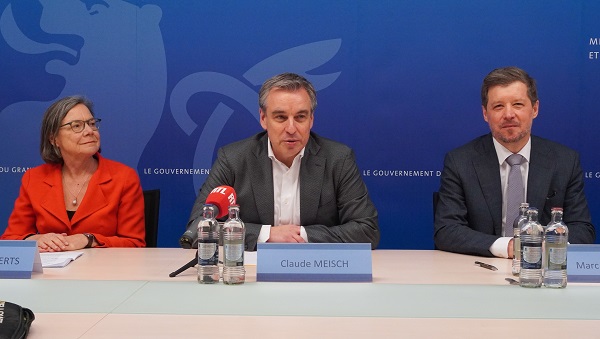 L-R: Martine Reicherts, Chair of FNR Board of Directors; Claude Meisch, Luxembourg's Minister of Higher Education & Research; Marc Schiltz, FNR Secretary General;
Credit: MESR
L-R: Martine Reicherts, Chair of FNR Board of Directors; Claude Meisch, Luxembourg's Minister of Higher Education & Research; Marc Schiltz, FNR Secretary General;
Credit: MESR
Luxembourg's Ministry of Higher Education and Research and the National Research Fund (Fonds National de la Recherche - FNR) recently launched the National Centres of Excellence in Research programme.
On Tuesday 24 January 2023, Luxembourg's Minister of Higher Education and Research, Claude Meisch, together with Martine Reicherts, Chair of the FNR Board of Directors, and Marc Schiltz, FNR Secretary General, presented a new research funding programme integrating the experiences of a pilot project launched in 2015: the National Centres of Excellence in Research (NCER).
This programme is considered an important element in achieving the objectives of the national research and innovation strategy adopted by the Luxembourg Government in early 2020. It offers a structuring framework and a funding instrument to bring together research excellence around a mission of significant societal interest, encouraging, in accordance with the aforementioned strategy, high-level transdisciplinary research and intersectoral collaboration, according to the Ministry of Higher Education and Research and the FNR.
After an NCER pilot project, the National Centre of Excellence in Research on Parkinson's disease (NCER-PD), in 2015, four NCER projects are planned for the period 2022-2025.
The first two projects, Clinnova, which focuses on digital health and personalised healthcare, and NCER-Fintech relating to digital technologies for finance, will be officially launched by March 2023.
While Clinnova is a joint project of the Luxembourg Institute of Health (LIH) and the Luxembourg Centre for Systems Biomedicine (LCSB) of the University of Luxembourg, in partnership with the Centre Hospitalier Luxembourg (CHL) and the Hôpitaux Robert Schuman (HRS), NCER-Fintech is carried out by the University of Luxembourg's Interdisciplinary Centre for Security, Reliability and Trust (SnT) and the law and finance departments of the university's Faculty of Law, Economics and Finance.
Two other NCER projects are in development: a project aimed at energy transition and a project relating to the education of the future with the development of new learning environments adapted to the new challenges of the world of work.
The NCER projects are funded by the FNR on the basis of an international independent evaluation for a maximum period of eight years.
The maximum amount of funding for an NCER is €15 million over five to eight years. Added to this are variable contributions from the research institutions themselves. The lifespan of a centre is linked to its impact and usefulness in the field. When an NCER comes to an end, it is supposed to be structurally anchored in its home institutions and can then give way to other future national centres of excellence.








